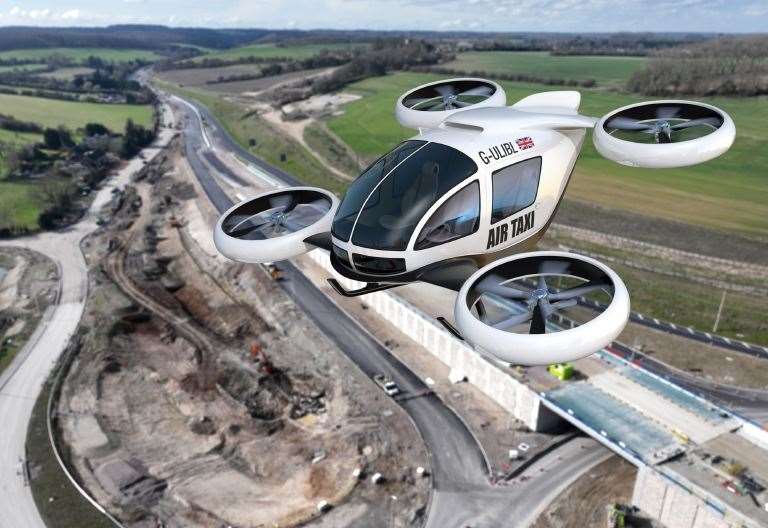Flying taxis could soon be seen in skies over Kent in a nationwide first as the next generation of drone technology looks set to transform travel.
Plans have been drawn up to trial cutting-edge electric aircraft in Swale, with the district being selected in part because of the ongoing traffic gridlock plaguing roads in and around Sittingbourne.

The ground-breaking experiment to test the viability of battery-powered aviation for shorter journeys would see a fleet of flying taxis – each large enough to carry up to six passengers at a time – deployed from a redeveloped Farthing Corner airfield in Hartlip.
Although the firm behind the technology acknowledges it may take a leap of faith for people to believe in the remote-controlled flying machines, it insists that its proprietary technology is safe, reliable and ready to help remove polluting vehicles from our congested roads.
May Dupp, chief technology officer at aviation start-up Iocus, told KentOnline the Swale trial could be an important step in proving the viability of flying taxis for markets around the globe.
She said: “We have invested significant time and effort into developing autonomous aerial craft which operate using our revolutionary Flight Orientation and Optimisation Learning System, which uses AI to produce flight plans and manage passenger demand for greater efficiency.
“This FOOLS software enables us to harness existing drone technology to scale up the size of our aircraft and produce ‘flying taxis’ which can transport small groups of passengers more efficiently over short distances, when compared to automobiles which face the day to day delays caused by traffic on the roads.

“We are delighted that Swale will be a testing ground – or perhaps, air – for this technology, which we believe represents the future in urban mobility around the world as we seek to decarbonise travel and disrupt the traditional means of getting from A to B.”
Sittingbourne has been selected to host the trial because of the ongoing challenges facing motorists in the area, where endless roadworks and ongoing house-building have put a strain on the road network.
It comes at a time when the government has announced a Future of Flight action plan, which it says will see drone technology transform our skies and boost the UK economy by £45 billion by the end of the decade.
Greener, quieter flying taxis are already undergoing the necessary approval process overseen by the Civil Aviation Authority (CAA), with the technology now on the cusp of being a common sight in our skies thanks to rapid advances in battery technology, which means the craft is now both light enough to stay in the air and powerful enough to cover the distances needed.
Announcing the Future of Flight plan, aviation and technology minister Anthony Browne said: “Cutting-edge battery technology will revolutionise transport as we know it – this plan will make sure we have the infrastructure and regulation in place to make it a reality.
“From flying taxis to emergency service drones, we’re making sure the UK is at the forefront of this dramatic shift in transportation – improving people’s lives and boosting the economy.”




